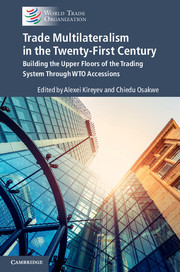 Trade Multilateralism in the Twenty-First Century
Trade Multilateralism in the Twenty-First Century Book contents
- Frontmatter
- Contents
- List of Plates
- List of Figures
- Notes on Contributors
- Foreword
- Acknowledgements
- List of Abbreviations
- Disclaimer
- 1 Making Trade Multilateralism Work for All: The Role of WTO Accessions
- PART I WTO Accessions and the New Trade Multilateralism
- 2 The WTO and the Changing State of the Global Economy
- 3 The Art and Science of Negotiation: De-politicizing and Technicizing Negotiations
- 4 The Accession of Kazakhstan: Dealing with Complexity
- 5 Helping Businesses Navigate WTO Accession
- 6 WTO Rules, Accession Protocols and Mega-Regionals: Complementarity and Governance in the Rules-Based Global Economy
- 7 Promoting Good Governance: From Encouraging a Principle to Taking Concrete Action - Examples from WTO Accession Protocols and the WTO Trade Facilitation Agreement
- 8 Transforming Accessions Data into Knowledge
- PART II Negotiators’ Perspectives on the WTO Accession Process
- PART III Accessions Acquis: Thematic Perspectives and Implementation Challenges
- Contributor Biographies
- Index
- References
2 - The WTO and the Changing State of the Global Economy
from PART I - WTO Accessions and the New Trade Multilateralism
Published online by Cambridge University Press: 28 November 2017
- Frontmatter
- Contents
- List of Plates
- List of Figures
- Notes on Contributors
- Foreword
- Acknowledgements
- List of Abbreviations
- Disclaimer
- 1 Making Trade Multilateralism Work for All: The Role of WTO Accessions
- PART I WTO Accessions and the New Trade Multilateralism
- 2 The WTO and the Changing State of the Global Economy
- 3 The Art and Science of Negotiation: De-politicizing and Technicizing Negotiations
- 4 The Accession of Kazakhstan: Dealing with Complexity
- 5 Helping Businesses Navigate WTO Accession
- 6 WTO Rules, Accession Protocols and Mega-Regionals: Complementarity and Governance in the Rules-Based Global Economy
- 7 Promoting Good Governance: From Encouraging a Principle to Taking Concrete Action - Examples from WTO Accession Protocols and the WTO Trade Facilitation Agreement
- 8 Transforming Accessions Data into Knowledge
- PART II Negotiators’ Perspectives on the WTO Accession Process
- PART III Accessions Acquis: Thematic Perspectives and Implementation Challenges
- Contributor Biographies
- Index
- References
Summary
Abstract
The world economy is showing signs of recovery after several years of lacklustre performance, although major policy uncertainties may easily upset this fragile trend. To jumpstart economies and trade after the financial crisis of 2008–9, governments across the world employed a traditional mix of fiscal, monetary and structural policies. These efforts helped to prevent a deeper crisis but fell short of pulling the world out of a period of stagnation in 2012–16. Trade, in particular, slowed relative to its historical performance and to overall economic growth. Meanwhile, political and social pressures have led to inward-looking policies in large countries. Other challenges – from civil and military conflicts to scattered terrorism – have also contributed to this inward turn. Against this background, this chapter discusses the need for a new and more flexible global economic architecture. It would require reforms at all levels, starting with revamping the structural foundations for growth and trade, applying solid, ground-level macroeconomic policies in individual countries, and rebuilding the upper floors of multilateral cooperation, i.e. upgrading it and making it more adaptable and responsive to the requirements of the twenty-first century. In the trade area, key pillars to support this structure include innovative mechanisms of trade liberalization in both new and traditional areas, increased inclusiveness of trade, recognition and financing of adjustment costs, effective communication on trade, a redefined role and functions for the WTO, upgraded multilateral rules and strong leadership. With radical changes needed, WTO accessions have already contributed, and could contribute even more, to each of these pillars.
For several years since the global financial crisis, the global economy has managed to avoid another systemic crisis and has been recovering gradually. However, growth has been low for so long that most people and businesses simply have not yet noticed that the economy was actually recovering. Weak economic growth, stagnant wages, high unemployment, and rising income inequality have stimulated support for inward-looking policies. Recovery has been sluggish and fragile, and its durability continues to be at risk. Recently some advanced economies have seen their GDP expand faster than expected, supported by a cyclical upturn in global manufacturing and trade. But at the same time, several emerging and advanced economies are still operating below capacity, and underlying core inflation is still low generally.
- Type
- Chapter
- Information
- Trade Multilateralism in the Twenty-First CenturyBuilding the Upper Floors of the Trading System through WTO Accessions, pp. 29 - 54Publisher: Cambridge University PressPrint publication year: 2017
References
- 1
- Cited by


